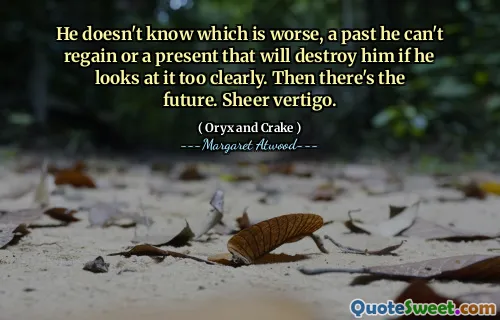He compiled lists of old words too – words of a precision and suggestiveness that no longer had a meaningful application in today's world, or toady's world, as Jimmy sometimes deliberately misspelled it on his term papers. {Typo, the profs would note, which showed how alert they were.} He memorized these hoary locutions, tossed them left-handed into conversation: wheelwright, lodestone, saturnine, adamant. He'd developed a strangely tender feeling towards such words, as if they were children abandoned in the woods and it was his duty to rescue them.
In "Oryx and Crake," the character Jimmy demonstrates a unique connection to language by collecting and memorizing old words that have lost their relevance in contemporary society. He intentionally miswrites "today" to "toady," which draws the attention of his professors. This small detail highlights his awareness and perhaps a playful rebellion against academic conventions. The old words he retrieves—like "wheelwright" and "lodestone"—reflect a rich history of language that he feels compelled to preserve.
Jimmy's affection for these archaic terms is almost paternal; he views them as neglected children in need of care. By incorporating them into his speech, he aims to revive their significance and keep their meanings alive. His behavior illustrates a profound appreciation for the artistry of language, contrasting sharply with a world that may prioritize modernity over tradition. This emotional bond underscores his character's depth and the broader themes of loss and memory in Atwood's narrative.






